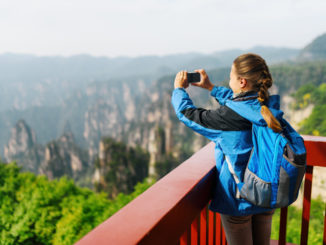THEY contribute the largest share of tourists to the Asia Pacific and also more money to the global tourism industry than any other nation. But a cultural gap is evident.
From wrecking coral to throwing rubbish into the sea, to vandalising heritage and defecating in public, travelers from China have a lot to learn about etiquette in the countries they visit.

Switzerland, for example, considers them loud and rude, going as far as introducing separate trains for Chinese tourists. The notice, published in a local newspaper, also includes an illustration instructing tourists to sit on toilet seats rather than to squat on them.
But worse things have happened, of course.
In 2013, a 15-year-old defaced an Egyptian artifact at a 3,5000-year-old temple in Egypt, writing, “Ding Jinhao was here”. A year later, a Thai AirAsia flight bound for Nanjing, China was forced to return to Bangkok after an unruly Chinese passenger threw scalding hot water on a flight attendant.

This is despite China’s National Tourism agency releasing a 64-page illustrated guide for how citizens should behave when they travel abroad back in 2013.
In 2016, Chinese tourists, armed with selfie sticks, appeared on Japanese TV clambering over Japan’s national symbol, the sakura (cherry blossom) tree, in an attempt to “get the best shot”. Animals aren’t spared either.
One kangaroo was killed and another injured at Fuzhou Zoo in Fujian Province when zoo-goers attempted to “make it jump”. The visitors had thrown rocks at the animals that were in an enclosure separated by fences.
The death of the kangaroo, a 12-year-old female, was due to excessive blood loss in the kidney.
In 2016, two peacocks at Yunnan Wild Animal Park in Kunming died from shock after experiencing violent behavior from Chinese tourists. Visitors had forcefully picked them up to pose for photographs and plucked out their feathers.
History repeated itself recently when tourists plucked the tail feathers from four live peacocks at Liwan Zoo in Yangzhou.
According to the Beijing Youth Daily, traces of blood were still at the scene after the assault on the bird. Pictures on social media showed all the peacocks’ long tail feathers had been pulled out. The zoo is now going to put an extra two staff to watch over the enclosure.
This is despite China’s National Tourism agency releasing a 64-page illustrated guide for how citizens should behave when they travel abroad back in 2013.
Thailand’s Tourism Authority of Thailand (TAT) has sought help from its Chinese counterpart to warn Chinese tourists to behave while visiting Thailand.
The Hokkaido government in Japan has issued a booklet on bad manners aimed at Chinese visitors.
At home, China’s state news agency Xinhua did the same, releasing a long list of guidelines complete with illustrations issued by the National Tourism Administration. Here are some of the don’ts:
- Don’t take the life vests and blankets off the plane.
- Don’t spit phlegm or gum, throw litter, urinate or defecate wherever you feel like it.
- Don’t take the ashtray or bath towels from guest rooms.
- Don’t use towels or bed sheets to wipe your shoes.
- Don’t cough, sneeze or pick your nose or teeth in front of others.
It also included country-specific advice: Chinese visitors to Germany should only snap their fingers to beckon dogs, not humans.
However, the guidelines weren’t very well received. Bangkok Post quoted 33-year-old tourist Zhang, who was visiting Hong Kong from Anhui, as saying that the guidelines were “too many” and “too specific”.
“You cannot possibly look through all of the rules before you go traveling. Also, the rules are different in different places,” he complained.
“I think it’s not very feasible.”
By



